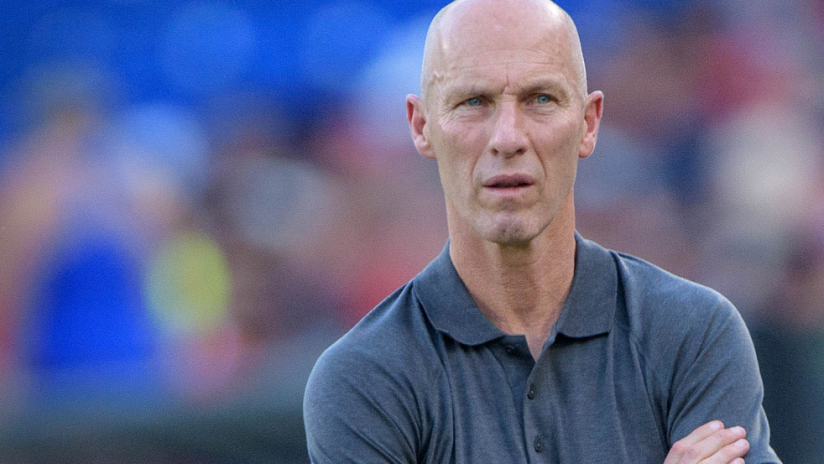It’s trophy time again in Major League Soccer. Let’s dig in.
Canadian Championship
Finals come first, and both Voyageurs Cup glory and a 2019 Concacaf Champions League place are up for grabs as we prepare for the first leg between the Vancouver Whitecaps and Toronto FC.
Trophy snobbery is lame. The Canadian Championship may only involve six teams (for now; shoutout to the Oakville Blue Devils), but that doesn’t mean its participants don’t care deeply. Here’s how to watch and what’s at stake…
Vancouver vs. Toronto, Leg 1, Canadian Championship final | 10 pm ET | TSN1/4
Vancouver Whitecaps FC
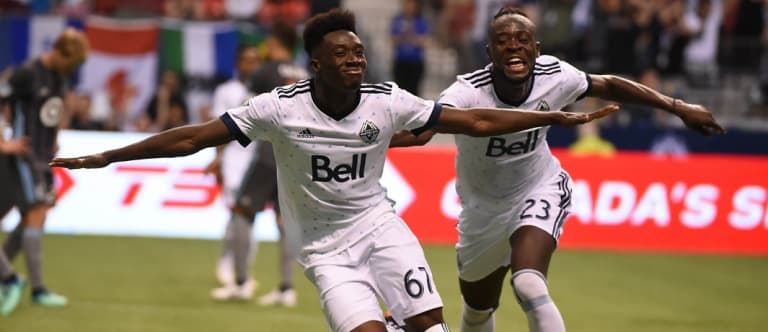
Alphonso Davies and Kei Kamara | USA Today Sports Images
Five things to consider:
- 2015 Voyageurs Cup champion
- Eight-time runner-up (2005, 2007, 2009, 2010, 2011, 2012, 2013, 2016)
- Lost to Toronto FC on away goals in 2016 final thanks to Will Johnson’s stoppage-time goal
- Last go-round with Bayern Munich-bound Alphonso Davies, their best player this year
- Currently on pace to continue playoffs yo-yo, in last year and out in 2018
What does this tournament mean to Vancouver? Just take a look at how Carl Robinson handled last weekend’s trip to the Bronx and the Whitecaps’ decisive second-leg victory against the Montreal Impact.
Robinson left a handful of starters back in B.C. last weekend (Kei Kamara, Doneil Henry, Jake Nerwinski, Jose Aja and Kendall Waston) and Alphonso Davies, Yordy Reyna, Cristian Techera and Marcel De Jong started out on the substitutes’ bench. More on that here. Those starters were on the field – and the made the difference – as the ‘Caps fought back in the semis.
Why would Robinson prioritize the Voyageurs Cup when Vancouver still sit below the playoff line, you might ask? Simple. Cross-country trips to MLS Cup contenders don’t generally end in three points, and the ‘Caps have a snakebit history in the Canadian Championship stretching back to their USL days.
Only the Toronto Lynx (four) have more runner-up finishes than Vancouver, and the loss to TFC in the 2016 final was particularly painful, a Will Johnson goal in stoppage time delivering an away-goal victory to the Reds.
“We’ve had a lot of drama and a lot heartbreak in this tournament in the past,” Homegrown midfielder Russell Teibert, who has a record 21 appearances in the competition, told The Province. “That’s just one of the times.”
And while the CCL berth matters – the ‘Caps made a run to the semifinals in 2016-17 – this final is more about showing Canada and the rest of MLS that TFC aren’t the only powers north of the border. Trophies validate projects, and after years of inconsistency and postseason pain at the hands of Cascadia rivals, Vancouver need something to hang their hat on should their playoff chase fall short.
Toronto FC
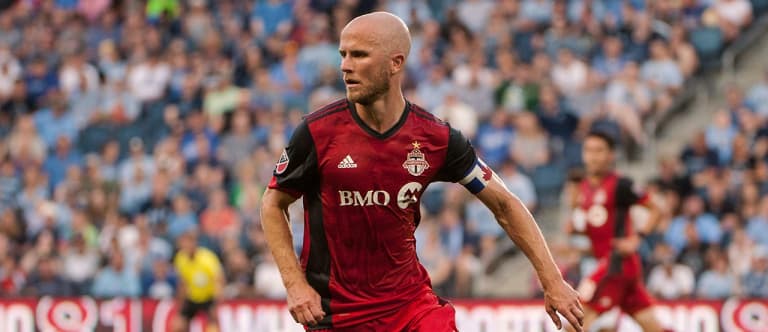
Michael Bradley | USA Today Sports Images
Five things to consider:
- Six-time Voyageurs Cup champion (2009, 2010, 2011, 2012, 2016, 2017)
- Two-time runner-up (2008, 2014)
- Defending MLS Cup champions and treble holders, currently below the playoff line
- Still recovering from gut-punch loss in CCL final and subsequent injuries
- Sebastian Giovinco (who remained home for the first leg) contract uncertainty clouds short- and long-term future
Windows can close quickly. Toronto FC are grappling with that possibility just months after winning a treble and nearly making history in CCL.
I happen to believe the Reds will end up in the playoffs, meaning they’d have more than one front on which to win a trophy. Regardless, they have only one route for a CCL return. That’s the Canadian Championship, and the result of this two-legged final could change the way the club thinks about the future given the way the chase for history has wedged itself in the club’s psyche.
If they have another CCL run to plan for in 2019, that could provide some clarity to the Giovinco contract negotiations and the winter transfer window. If not, might long-term planning trump short-term ambitions? Could we see the core of the club turn over?
We’ll just have to wait and see. This final will be the first domino of many to fall in the next six months.
Lamar Hunt U.S. Open Cup
History matters, and so does the U.S. Open Cup, now in its 105th year of existence. I watched Sporting Kansas City win it last year, paint the wall and party into the early hours on a Wednesday. I watched the New York Red Bulls wallow in misery waiting for their runner-up medals.
Winning the tournament will change the present (trophies, baby) and future (CCL berth) for whichever team emerges victorious. First, though, you’ve got to win a semifinal.
Here’s how to watch and what’s at stake…
Philadelphia vs. Chicago, USOC semifinal | 7 pm ET | Streamed live on USSoccer.com, club sites
Philadelphia Union
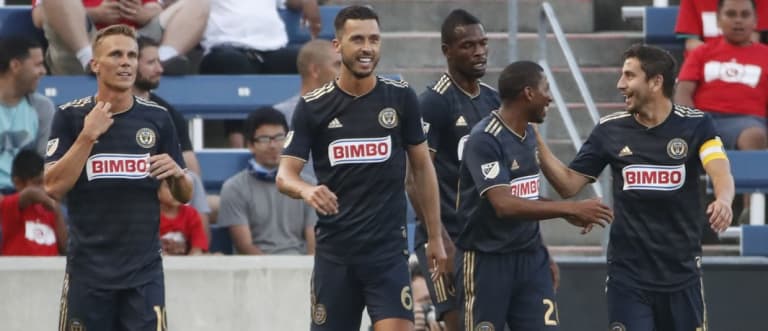
The Union celebrate a goal | USA Today Sports Images
Five things to consider:
- Two-time USOC runner-up (2014, 2015)
- Lost both USOC finals … at home
- Zero trophies in club history
- Currently below the playoff line, qualified for playoffs twice in eight years
- No significant moves in transfer window
The Union are gambling that what they currently have will be enough to 1) win Open Cup and 2) sneak into the playoffs. They might be right. It might blow up in their faces. Matthew De George did a wonderful job breaking it all down here.
This semifinal is massive for a club with an empty trophy case and fans that have stuck with them through years of mediocre results. An Open Cup win would give those supporters something to celebrate, validate the build-from-within ethos that Earnie Stewart emphasized and give Jim Curtin something to point to should the playoff push come up short.
If they lose – now or in the final, which will be on the road should they make it that far – questions will rightly be asked about the transfer philosophy in both the winter and summer and what that says about the ambition of the club.
If the Union win, they’ll have something shiny to parade around Philly, a burst of positivity that could propel them into the playoffs and a first-ever CCL campaign to plan for. It’s always better to win, something this club knows all too well from the disappointments of 2014 and 2015.
Chicago Fire
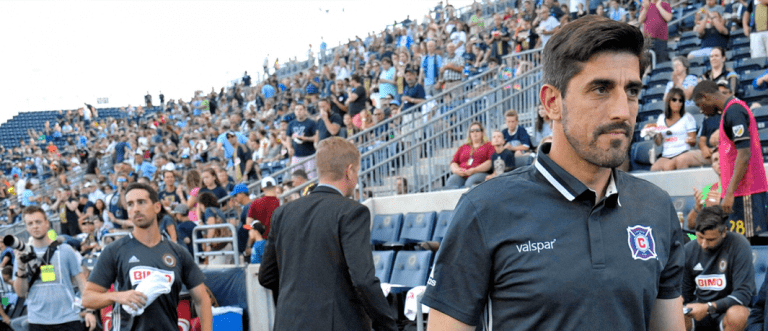
Veljko Paunovic | USA Today Sports Images
Five things to consider:
- Four-time USOC champions (1998, 2000, 2003, 2006), tied for second most all-time
- Two-time USOC runner-up (2004, 2011)
- Eliminated in the final or semifinal in five of the last seven seasons
- Quiet winter and summer transfer windows following bounce-back 2017 season
- Head coach Veljko Paunovic in final year of his contract
The Fire prioritize the Open Cup and have since their very first season in 1998. That year, Bob Bradley won the double as Chicago became the bellwether for expansion season success.
That was 20 years ago. The club’s last trophy came in 2006. You can do that math. Since that Open Cup triumph, the Fire have collected more playoff DNQs than playoff berths. Then Bastian Schweinsteiger, Nemanja Nikolic and Dax McCarty arrived and helped reinvigorate the club. They returned to the playoffs last year, only to get smoked at home by the Red Bulls.
But it was getting better, right?
Unfortunately, 2017’s momentum has evaporated, and Chicago once again find themselves near the bottom of the Eastern Conference table, looking for consolation prizes should the transfer window close with no significant activity and the playoffs remain out of reach, both distinct possibilities.
Like the Union, the Fire hope the Open Cup can be a door to bigger and better things. Like the Union, the Fire need some sign of tangible progress to validate their process. Like the Union, a loss here might mean another season with little to show for their efforts.
Houston Dynamo
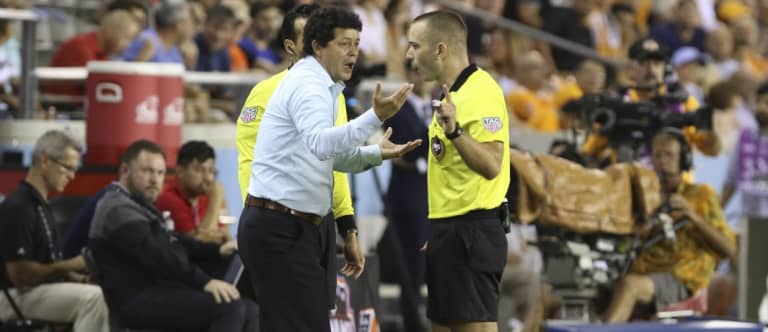
Wilmer Cabrera | USA Today Sports Images
Five things to consider:
- Houston haven’t won a trophy since 2007 MLS Cup
- Houston haven’t made a USOC semifinal since 2009
- Mauro Manotas scored three goals in the Round of 16 and quarterfinal
- The Dynamo sit seven points out of the final playoff spot in the West
- The final will be played at BBVA Compass Stadium if Houston and Philadelphia win
The best way to win the Open Cup is to play as many games at home as possible. Three home games for the Dynamo so far in this competition equals three wins. They’re back at home to face road-weary LAFC, and could host the final should the Fire lose to the Union.
Like both their Eastern Conference counterparts, Houston are confronting the reality that the playoffs might end up out of reach. They’re currently below the playoff line, seven points back of Real Salt Lake, and have the league’s lowest payroll, according to MLS Players Union data. You could argue that even if Wilmer Cabrera’s team misses the playoffs, an Open Cup win would make 2018 a success given the level of spending.
That argument becomes moot should the Dynamo lose at home in the semifinal. If that happens, you’d have to go all the way back to the club’s first two seasons in Houston (2006, 2007) for silverware. That’s a long time.
Los Angeles Football Club
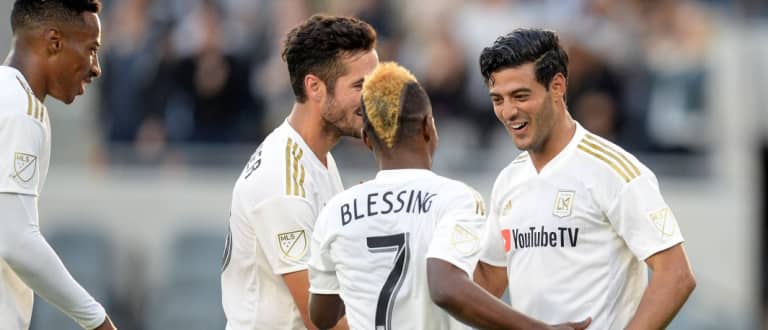
LAFC celebrate a Carlos Vela goal | USA Today Sports Images
Five things to consider:
- This is LAFC’s first-ever season and first-ever USOC appearance
- Bob Bradley won USOC in 1998 with the expansion Fire
- LAFC have spent big and, it appears, wisely, in Year 1
- The Portland Timbers protested their quarterfinal loss because of number of foreign players in LAFC's lineup
- Christian Ramirez is cup-tied and will not be available
LAFC are the most talented team left in the competition. It won’t be a disaster if they don’t win, but it will be a missed opportunity to make real, concrete history in Year 1. Bob Bradley knows what that sort of success can do for an expansion club.
If they can win in Houston and the Union win at home against the Fire, Banc of California Stadium will host a final in its first year. That’s the sort of occasion that could elevate an already-high-flying club and squad to even greater heights.
If they can’t master the Texas heat and the Dynamo’s triple threat of attackers, it won’t seriously tarnish the shine of an already-successful first season. There’s always MLS Cup.

